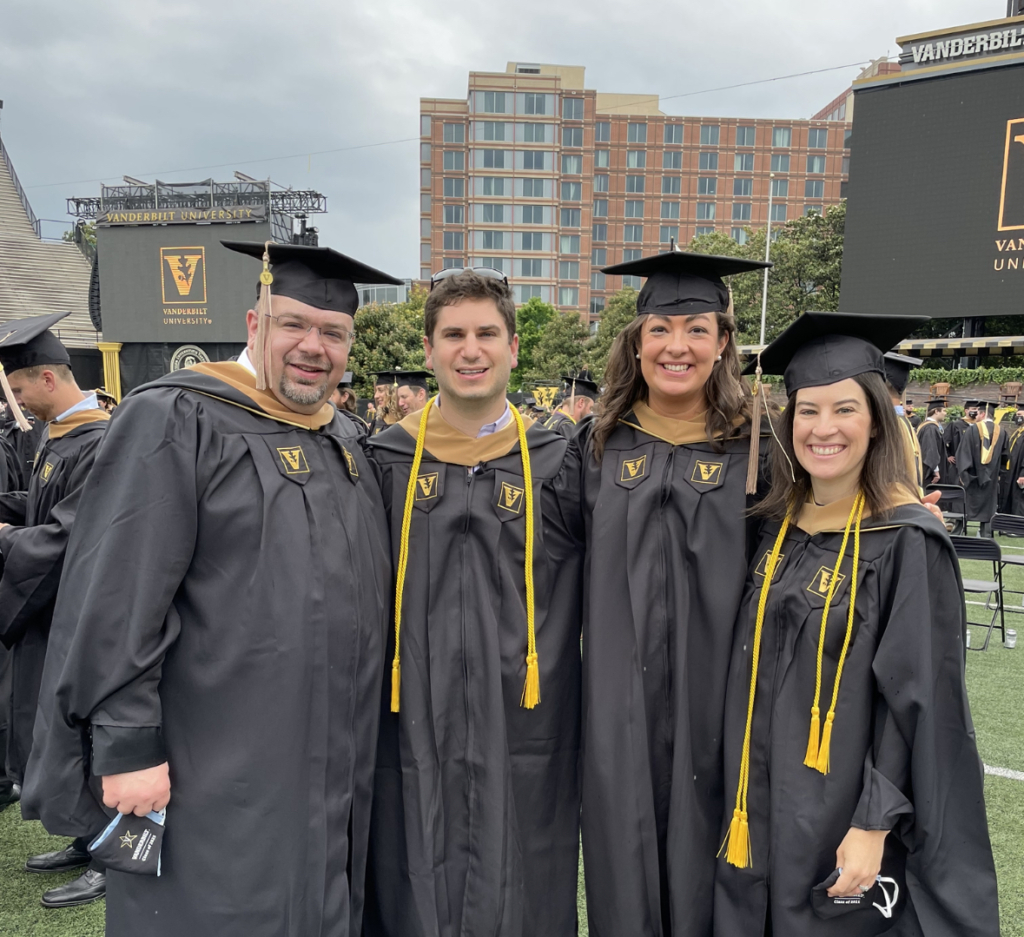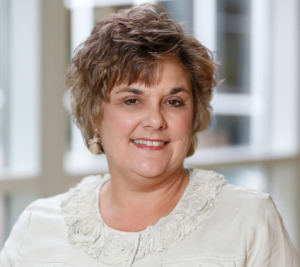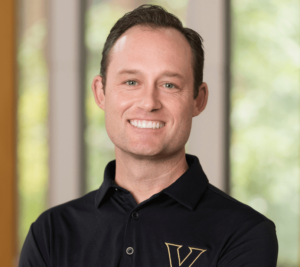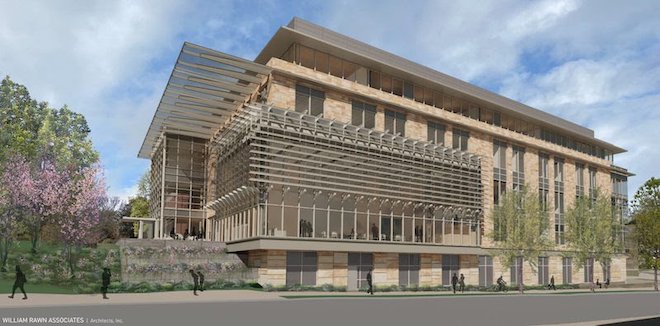
Tara Tenorio poses with EMBA classmates at the Vanderbilt Owen graduation in May 2021. Courtesy photo
What’s the history of the Vanderbilt EMBA?
Juli Bennett: We graduated our first class in 1980 or 1981. We were one of the first 50 EMBA programs globally. While we are a very young MBA program, we are one of the oldest EMBA programs, which is fascinating to me. Where I think of us as being kind of a young and scrappy business school, our executive MBA is quite well established.
Vanderbilt University has one of the strongest centers for Latin American Studies dating back to the 1940s. As part of that, we had a relationship with the Brazilian school FIA. A number of their PhDs and their global leaders in that country have come through our PhD in Economics program at Vanderbilt. So there was a very strong affinity for Brazil in particular; they brought their students to our campus to do their executive MBA student residency in the U.S. for years. They were bringing their EMBA students to Nashville – not to New York, not that not to San Francisco. Out of that came a desire to have a more global program.
We quite intentionally chose to do a global program that was based on what the businesses in Nashville, and across the U.S., do – and that is they align their businesses across the Americas. I’ll use the example of Bridgestone or Nissan – our bread and butter kind of consumer products companies – which very much aligned themselves across the Americas. So we looked at the four biggest economies and schools that are agile enough to do this unique program with us and host students on their campuses.

Juli Bennett
FIA was our first partner, and then partnered with Simon Fraser University in Canada and ITAM in Mexico. We graduated our first class in the Global Immersion track in 2013.
So faculty at the partner schools teach the classes in the Global Immersion?
Juli Bennett: Yes, their faculty teach two courses in each location. Our faculty, when they come to Nashville, teach the things that Vanderbilt is good at: We teach innovation and creating and launching new ventures. That cohort also does a capstone strategy project with some type of global implication
The Executive Edge cohort usually does a domestic capstone strategy project, and both cohorts do a creating and launching new ventures project.
What kind of student are you targeting?
Joe Wagstaffe: There’s two ways to answer that question. From a demographic perspective, it’s anybody and everybody, and in fact, that’s what makes my job so interesting. When I started this job seven months ago, I thought “Okay, I’m going to Nashville, so half the class will be health care, and half the class will be filled with everybody else. But that is not the case. We obviously have a strong representation in the healthcare sector, but really across industry as well with the amount of tech that’s shown up here with Oracle and Amazon. Itt’s across the board of who’s in the classroom.
One thing that’s really interesting and fascinating is I’ve tried to find the common denominator of, Who are these people? What it comes down to, and this is probably true of many EMBA students, is you get to that mid-career point where you have this itch in your soul. You know, is there more opportunity for learning and growth? And, that’s what they connect on. When you’ve got that common denominator amongst people from so many different industries and from so many different points in their career., it adds this really unique spice in the classroom.
From a geographic perspective, because of our cadence. I would say probably the majority of our cohort comes from about a three hour radius. However, because we meet every other Saturday, we’re pretty low disruption when it comes to work life and family life. So, that allows us to expand our net and we have had students from my hometown of Santa Fe, California, Arizona, and other places.
What are the differentiators to the Vanderbilt EMBA?
Joe Wagstaffe: I think that the global track in the second year is a huge one. The way that I've always talked with candidates about it is sort of like you don't declare your major until your second year. That's where they get to decide if they're staying on the executive track or if they're going on the global track.
Our program is orchestrated as a lockstep program for a number of reasons. A large one being that it's really collaborative. We put the students into teams, and I always joke it's like my fantasy football draft board. We've got everybody's name and experience on multicolor post-it notes, and we consider who's gonna work well together. We take some time to really figure out what their expertise is, what they bring to the table, what their gaps are, as well as what they want. We just try to pair them up with somebody that is not like them. Everybody's sort of working towards that C-suite, so we call it our C-team program.

Joe Wagstaffe
It's a big reveal. During our first week-in residency, everybody gets hyped up on who's going to be in their team. People work in those teams throughout their first and second year. We have a little bit of a shuffle from year one to year two after finding out who’s going into the global track. But, you're working really collaboratively throughout, and I think that sets us apart. There's going to be times where things are working really swimmingly and other times where you're butting heads. I really like when there's both because that's real life.
Also, the diversity of our program is a huge piece of it. It's a focus during our recruitment process of how are we putting together this class that is representative of the business world of the Nashville community. We've got a really healthy representation of military folks, women and underrepresented minorities. We're looking at a whole profile and a whole person to figure out what they bring to the table and how that enriches the classroom.
Juli Bennett: I'll just give a little definition to that C-Team for you. What we're trying to do is create industry and job function diversity in addition to the kind of traditional diversity you think of. That means a C-Team should have representation of finance or accounting, human resources, marketing, and operations, to really bring together all those functions of business.
Those people just tend to think differently, but that's where the growth and the exponential performance of a team comes together. We also have a C-Team coach to help them really think about how to leverage the strength of your team, how to stretch your wings and do the thing that you're not comfortable with. You don’t want all financial statements to fall to the accountant on the team. We also want the marketing person or the operations person to really learn how to do that as well.
What kind of demand trends are you seeing? I know that the pandemic made everybody's numbers funky for a while. Are you looking at growing the cohort or any or any plans for expansion?
Juli Bennett: I would say we're trying to stabilize.. As you mentioned, we've seen some swings through the pandemic. I don't know that we're going to say, right now, for next year, we're going to grow. Will that be a goal in the future? Perhaps.
We have always hung our hat on being a cohort that is quite intentionally small, personal, and world class, and yet have very personal relationships. And I think that won't change.That's what we are and who we are and what we do.
We're seeing trends return to what they were pre pandemic. We're seeing fantastic applicants come in, but we're not seeing every applicant from every corner of the country or the world in the way that we were when people were sitting at home online during the pandemic.
We’ve seen several schools – Wharton and Emory Goizueta, for example – who’ve launched online or hybrid EMBAs. Has Vanderbilt Owen had any discussions around alternate delivery models?
Juli Bennett: We're certainly watching trends. We won't be a first mover around that, we'll wait and see how that goes.
I’ll go to a throwback on that: There were times when EMBA programs were all handing iPads to their students with all their books already loaded. That lasted about two or three years, and then they realized nobody actually wanted it. What students really wanted was to have access to their materials on any device. They handed the iPads to their six-year-olds and let them play on them.
I don't think the online or hybrid trend is going away like that. However, I think what we learned when we flipped to hybrid when we were forced to, is that we're very committed to being in the classroom. We deliver the best EMBA experience at Vanderbilt by being in person. It's just who we are, and that's very hard to deliver in an online format. So will we not go with that trend? I can't say it would never happen. Will it happen next year?
We are doing other things online. Our executive education is offering online certificates. We are certainly dipping our toe in that water.
With business and business education changing so rapidly, have you made any curriculum updates or had any discussions in that regard?
Juli Bennett: We have a new dean coming in, and there will be a full curriculum review. We're not going to make big changes at this exact moment, but I foresee that coming along the path for sure. We have had faculty changes as well, but I think holding to the core of the curriculum at this point is where we are.
We are making sure that we really double down on those experiential learning experiences mentioned in those capstone experiences. You know, the last time we were in class, Joe and I sat with 14 venture capitalists and watched the venture capital presentations and had conversations about where they were going to invest their money. Nashville is a very entrepreneurial city. We have an Entrepreneur Center that's been in place now for a few years. So I think that's something we've doubled down on, in addition to really just thinking about strategy going forward which has become much more complicated in the world we're living in that is every changing and ever shifting at this point.

Vanderbilt Owen Graduate School of Management recently completed a $55 million renovation of Management Hall, its main building on campus. Courtesy image
And Vanderbilt Owen has a new building project in the works?
Juli Bennett: Yes, we are super excited. I’m a graduate of the program from 1993, so I've been in the building a long time. I love the place. What brings tears to my eyes is when I walk in the building, it still feels like the place I know. But, we have a beautiful new state-of-the-art, four-storey building that is seamlessly now attached to the older building that's all been renovated.
At the top of that fourth floor overlooks the growing downtown Nashville and a beautiful, beautiful Vanderbilt campus. The classrooms there are dedicated to executive space, whether it be executive education on the weekdays or our EMBA program on the weekend. Our Master of Management Healthcare program is there also.
When will the project open to students?
Juli Bennett: We have been in the space since late August in brand new classrooms on the second floor. The fourth floor of the building is going through the inspection process, so we will be in it this semester.
Joe Wagstaffe: It’s exciting to be in a brand new building, in a city that is drawing people in. I’m a product of that. I moved here over the summer and have absolutely adored being here. Some people are scared of all the transplants, but I think it adds to how cool Nashville is right now. You’ve got this wonderful new building, at a fantastic university, in one of the neatest cities in the country. To me, that is exciting.
Anything else you’d like add?
Juli Bennett: I would say that the Saturday only format has been very friendly toward women. We changed that in 2009 for the first graduating class of 2011. It was an unexpected benefit.
When the 2008 financial crisis hit, we realized people can't be off on Fridays. We had always been like 10%, maybe 15% women, but we’ve now been 30% to 35% women ever since. It was a huge boost to us.
Working moms now come in from Atlanta, and that's a very different demographic than we ever had. We used to be at the end of the spectrum – like 28-year-old women or 45-year-old women, but none in those childbearing years. That's where the growth came.
We're also a very military friendly school. We have a full, unlimited, match on the Yellow Ribbon program for veterans who would qualify, and we typically have 15% to 20% military representation in the classroom.
DON’T MISS THESE STORIES IN OUR EMBA SPOTLIGHT SERIES:
- UW FOSTER’S PROGRAM BRINGS STUDENTS TO SEATTLE’S TECH MECCA
- EMORY GOIZUETA’S PURSUIT OF FLEXIBILITY
- TCU NEELEY’S PROMISE: ‘ROI STARTS MONDAY’
- AT UMN CARLSON, A NEW CURRICULUM & HYBRID OPTION
- HOW CORNELL JOHNSON’S PROGRAM IS UNIQUELY SUITED TO THE MOMENT
- THE BENEFITS OF RUTGERS' ACADEMIC-RUN EMBA POWERHOUSE





Questions about this article? Email us or leave a comment below.